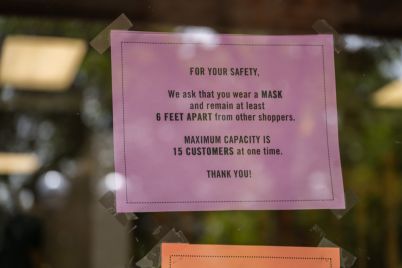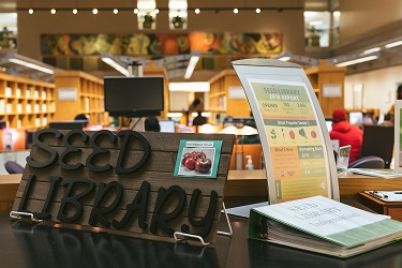
Ahmad Abu-Shtayyah, 22, a science technology student of Ypsilanti, is the president of the Muslim Student Association at WCC. Gray Bancroft | Washtenaw Voice
By Ivan Flores
Staff Writer
Ahlam Al-Kubaty hadn’t heard of Donald Trump, one of the Republican presidential candidates. The 22 year-old student from Yemen was surprised to hear Trump’s suggestion to temporarily ban Muslims from entering the United States.
“Why?” she asked.
Al-Kubaty came to the United States two years ago to pursue education. She’s in Washtenaw Community College’s radiography program. However, since her country descended into civil war in 2015, she sees her future here.
“(Yemen) is not safe,” she said. “The war is everywhere.”
In November of 2015, Paris suffered a series of terrorist attacks. The perpetrators were all European citizens, but Western public opinion turned against Syrian refugees, most of whom are Muslim. In the U.S., several governors, including Rick Snyder, sent letters to Secretary of State John Kerry requesting that the relocation of Syrian refugees be suspended. It was in the wake of this incident that Trump called for America’s borders to be temporarily closed to Muslims. More recently, Ted Cruz, another presidential hopeful, said that police should step up patrols of predominantly Muslim neighborhoods.
According to a National Public Radio report, more people in the U.S. have been killed by right-wing extremists than by jihadi terrorists since 9/11. The average American citizen is 3,000-5,000 times more likely to be killed by another American with a gun than by a jihadi terrorist.
For Muslims, the atmosphere of mistrust and even hate is something they have to deal with constantly. Miski Guilani is familiar with it.
“I was at a gas station,” she said, “and there was this guy… he (told me) ‘go back to your country, you Muslim trash.’ That really pissed me off.”
Guilani, 20, is an American citizen, but she immigrated from Somalia. Like Al-Kubaty, her home country is plagued by war. Guilani strongly maintains her Somali identity, but she is deeply rooted in the U.S. She is currently studying surgical technology at WCC and is hoping to get into the University of Michigan’s nursing program.
“I think it’s really hard for us,” Guilani said. “I can’t judge everyone, but there are those students who are automatically scared or threatened by you…It’s frustrating.”
Ahmad Abu-Shtayyah, 22, is the president of WCC’s Muslim Student Association. He is in the automotive program. He was born in Ypsilanti, and has lived in Ann Arbor his whole life. He is an active member the Islamic Center of Ann Arbor, where he enjoys practicing and sharing about his faith. Despite the current hostility towards Islam, he is optimistic that he and his fellow Muslims will come out of this stronger. In the meantime, he’s planning on pursuing his goals.
“I would like to open a (car) shop,” he said. “But first I want to get experience… Yeah, I’d like to get to open a shop and maybe live my life off of that.”
To combat complete ignorance of Islam, the Islamic Center offers a free class about the faith. “Islam 101” is held at the Islamic Center on Plymouth Road, at 7 p.m. on Wednesday nights. The participants are given an English translation of the Quran, as well as handouts about the five pillars of Islam and the Prophet Muhammad.
Abu-Shtayyah indicated that the attention Muslims have received since 9/11 hasn’t been entirely negative. Despite the hateful attitudes, many Americans have been drawn to Islam and converted. He doesn’t think that would have been possible without the post-9/11 awareness of Islam. Abu-Shtayyah believes that the challenges faced by himself and his fellow Muslims will ultimately make them stronger people.


